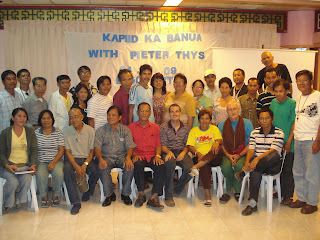title="Wordle: Blog Pieter">
alt="Wordle: Blog Pieter"
style="padding:4px;border:1px solid #ddd">


The KAPWA Upliftment Foundation marked its 30th anniversary celebration on July 3, 2009 at KAPWA Office located at Juna Subdivision, Matina, Davao City. With its theme “Building Partnership for Sustainable Development”, the ocassion was actively participated by former colleagues , development partners, IP leaders of partner communities and friends of KAPWA.
The celebration commenced with a thanksgiving mass celebrated by Fr. Emeterio Barcelon, SJ, the founding Chair of KAPWA Upliftment. A short program followed, with Mr. Ferdinand Marañon, KAPWA Board Chairman, welcomed the guests and visitors to the activity. Fr. Barcelon S.J., inspired the visitors especially KAPWA workers with his inspirational talk encouraging KAPWA workers to be more dedicated and committed in sharing its mission of service to others towards building a better future. A brief presentation on the KAPWA history was shared by Ms. Alma Monica de la Paz, the Executive Director. Central to its celebration was the book launching of KAPWA’s publication entitled “Change and Challenge”. This highlighted KAPWA’s experiences and learnings in their struggles of assisting the Indigenous peoples and upland communities in improving their quality of life while restoring the environment in the uplands.
For the past 30 years, KAPWA has devoted its services to serving the rural poor who live in deforested areas. It has provided services that have enabled them to acquire rights over the land they till, organize start up collective enterprises and enabled them to adapt farming systems appropriate to upland areas.
KAPWA has also trained non-government organizations, community based organizations and church workers on forest tenure and agroforestry technologies. We have worked side by side with local governments and other government and civic groups to protect our natural resources and restore degraded sites.
Founded on July 3, 1979, inspired by Fr. Emeterio J. Barcelon, S.J. as an entity to nurture service to others based on the teachings of the late Fr. Pedro Aruppe, S.J., then Jesuit Father General.
| Written by Dateline Philippines |
| Wednesday, 20 May 2009 09:33 |
| MANILA, Philippines – Members of Protestant churches in Germany will light more than 1000 candles in the city of Bremen on May 22 to call attention to the continued political killings in the Philippines. The activity, dubbed “Sumabay Tayo! Walking together – for justice!” is part of the “Kirchentag,” a biennial gathering of German Protestant churches that is based on a theme and draws thousands of people from all faiths, Hannah Wolf, spokeprson for the activity, said in an emailed statement. The candles will commemorate each of the more than 1,000 activists and political dissenters murdered since 2001, when President Gloria Macapagal-Arroyo came to power. Among the victims of extrajudicial killings are church people, lawyers, journalists, human rights defenders, farmers, workers, students and trade unionists. The protesters will also launch a signature campaign meant to pressure the Philippine government to “investigate the killings, compensate survivors and relatives of the victims, and to end not only the political killings, but all human rights violations in the Philippines.” Wolf, in the statement, said the activity’s organizers fear a deterioration of the “existing climate of impunity” with retired general Jovito Palparan’s assumption of a congressional seat representing the party-list Bantay. Palparan is accused by human rights groups of responsibility for hundreds of extrajudicial killings and enforced disappearances in areas he was assigned to as a military commander. “Palparan is known beyond Philippine borders as a notorious human rights violator who, like others, must be prosecuted and brought to justice,” Wolf said. Philipp Bück, coordinator of the German-based Action Network Human Rights-Philippines, said in the same statement: “More cases need to be prosecuted and perpetrators punished, particularly with regards to command responsibility within the police and military.” In March, the network conducted a mission in the Philippines to look into the implementation of recommendations by various international human rights experts and groups on how to end the killings and disappearances. Recently, United Nations special rapporteur Philip Alston, in a follow-up report to his fact-finding mission in 2007, said the government has failed to implement any of his recommendations and, thus, failed to quell the impunity that encouraged the commission of extrajudicial killings and other human rights abuses. In his original findings, Alston blamed most of the murders on a government counterinsurgency strategy that deliberately targeted members and leaders of legal organizations that authorities openly tagged legal fronts of the communist rebel movement. |




